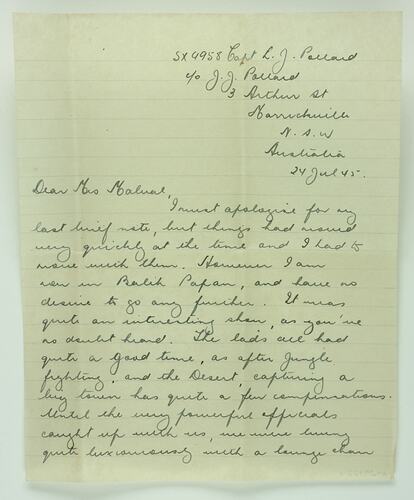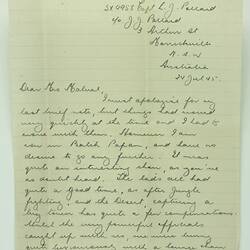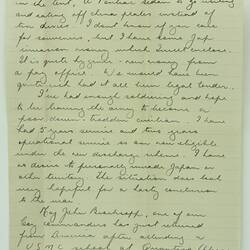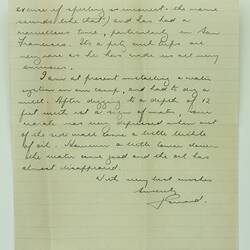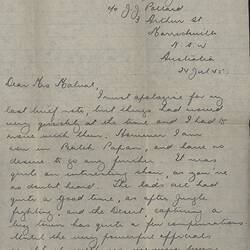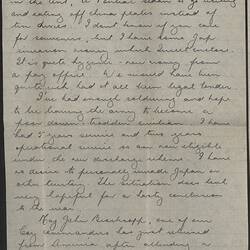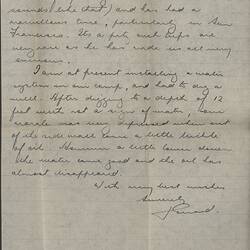Summary
Three page hand written letter written by Captain Leo James Pollard of the 2/10 Australian Infantry Battalion to Margaret Malval, dated 24 July 1945. This letter was sent as part of regular correspondence between Margaret and Leo. In this letter, Leo writes of capturing Balikpapan. He describes how the soldiers made themselves quite comfortable after the invasion, until the officials caught up with them. Leo expresses his desire to leave the army: he has had five years of service and two years of operational service and now wishes to return home as he does not want to be part of an invasion of Japan.
Margaret Malval emigrated to the United States of America from Melbourne, Australia in 1935. During World War II she volunteered for the American Women's Voluntary Services and sent packages to Australian soldiers through the Australian Comforts Fund, thereby entering into an exchange of correspondence with a number of Australian soldiers based in the Pacific and in Australia.
Physical Description
A three page letter, single sided, hand written with blue ink on lined paper. The paper has several creases in it where it has been folded in half and then into three uneven pieces.
Significance
This collection of letters and cards are significant as they illustrate the continuing ties felt by an emigrant to their country of birth. Margaret Malval was born and grew up in Melbourne, Victoria and moved to the United States of America to be married in 1935, where she lived for the rest of her life. Though her husband served in the United States Armed Forces, Margaret chose to send care packages to Australian soldiers through the Australian Comforts Fund, suggesting she retained strong ties to Australia.
These letters and cards were sent from Australian servicemen to Margaret, initially after receiving a care package from her which she donated through the Australian Comforts Fund. These letters and cards highlight the support of people on the home front for Australian servicemen by sending care packages through organisations like the Australian Comforts Fund, and the response of Australian Servicemen on receipt of these packages. Additionally, this collection also helps tell the stories of the frontline experience of Australian servicemen during World War II.
More Information
-
Collecting Areas
-
Acquisition Information
Donation from Ms Jeanne Cook, 05 Nov 2009
-
Author
Captain Leo J. Pollard, Balikpapan, East Kalimantan, Indonesia, 24 Jul 1945
-
Addressed To
Mrs Margaret L. Malval, Ridgefield, Connecticut, United States of America, 24 Jul 1945
-
Inscriptions
Hand written on lined paper: SX9958 Capt L J Pollard [extensive handwritten text]
-
Classification
-
Category
-
Discipline
-
Type of item
-
Overall Dimensions
150 mm (Width), 190 mm (Height)
-
Keywords
Australians at War, Correspondence, Military Communication, Military History, War Effort, War Service, Wars & Conflicts, World War II, 1939-1945, Soldiers' Comforts
